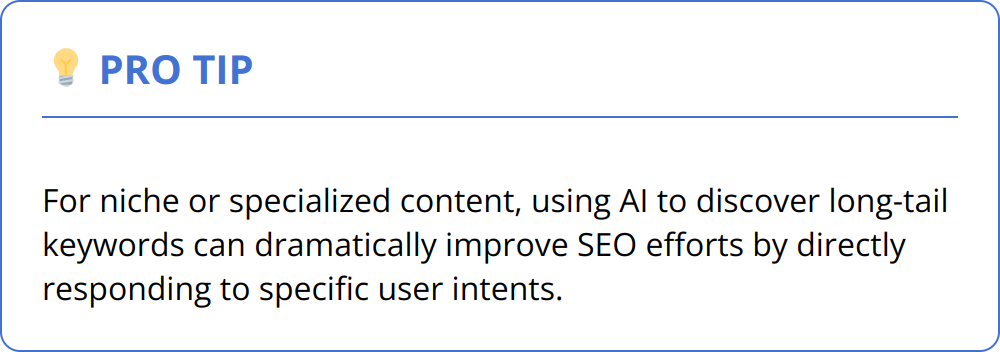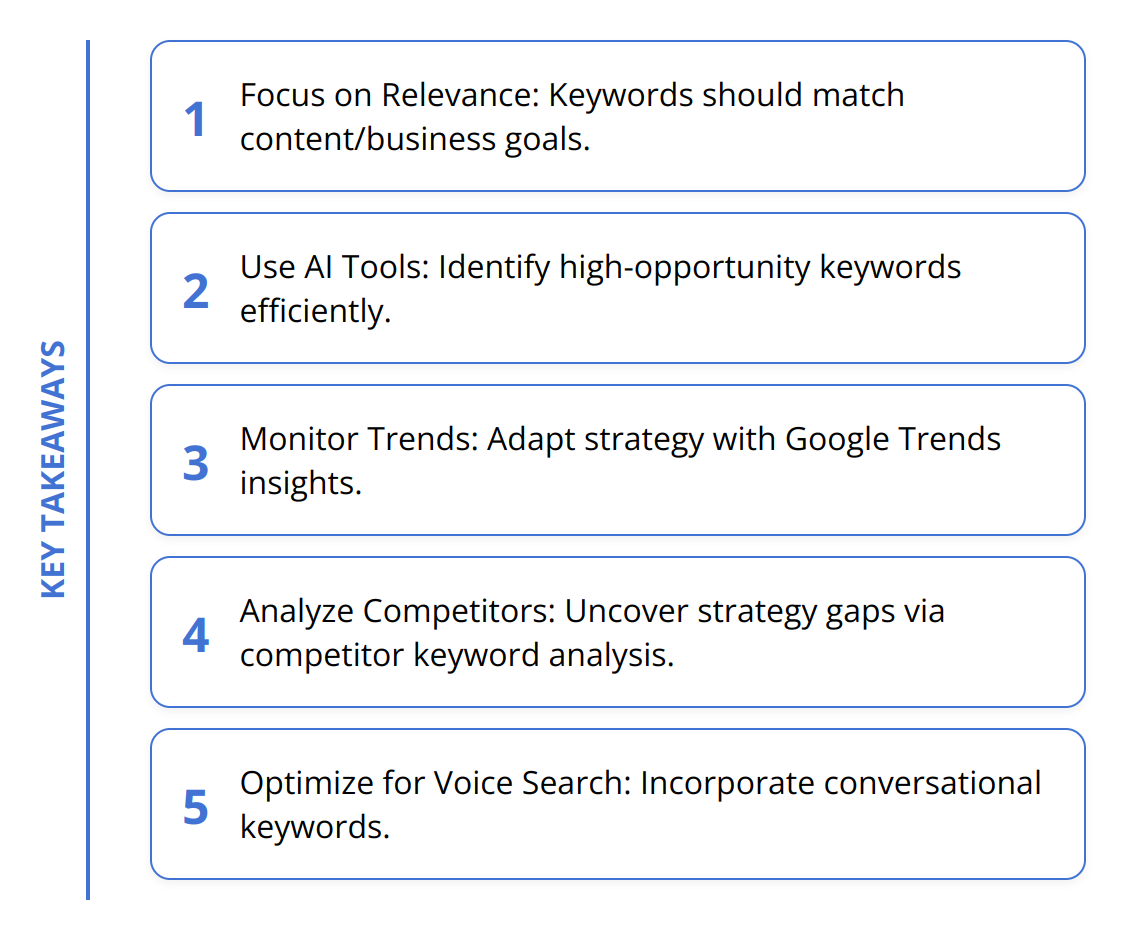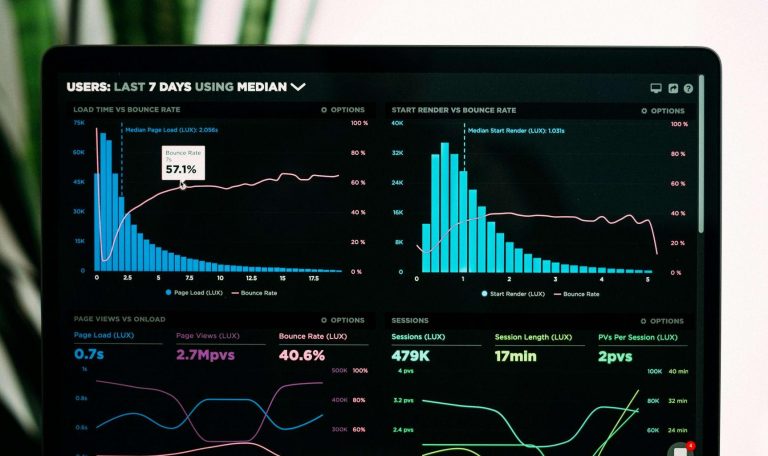Keywords are the cornerstone of effective SEO, ensuring your content is visible and accessible to your target audience. With the digital landscape evolving, understanding and leveraging these keywords has never been more important. We at Emplibot believe that AI is transforming how we identify and utilize keywords for optimal online presence. This guide explores the innovative intersection of AI and keyword research, offering practical insights to enhance your content strategy.
Contents
ToggleMastering Keyword SEO
In the realm of digital marketing, the right keywords aren’t just valuable; they’re your gateway to boosting online visibility and engagement. Understanding the nuance between short-tail and long-tail keywords is key. Short-tail keywords, often one to two words in length, are broad and highly competitive. They generate a vast amount of search volume but might not capture the specific intent of a user’s search. On the flip side, long-tail keywords, which are phrases composed of three or more words, might have a lower search volume but excel in specificity and relevance, leading to higher conversion rates.
The emergence of AI in keyword research has been nothing short of a revolution. Traditional methods of identifying relevant keywords often involved tedious manual research and guesswork. Now, AI-driven tools leverage big data and machine learning to analyze search patterns, understand user behavior, and predict which keywords will effectively reach your target audience.
Here’s why this matters: Google processes over 3.5 billion searches per day, with the majority of search users likely not going beyond the first page of search results. This stark statistic highlights the importance of ranking for the right keywords. AI tools go beyond the basic identification of keywords; they offer insights into search trends, competitiveness of the keywords, and how these align with user intent.

Current trends in keyword research signify a shift towards voice search optimization and local SEO, driven by the increasing use of mobile devices and voice-assisted technologies. Long-tail keywords are becoming even more critical, given their conversational tone, which matches well with voice search queries.
Practical Tips for Keyword Research
-
Focus on Relevance: Ensure keywords align with your content and business goals.
-
Use AI Tools: Leverage AI keyword research tools to identify high-opportunity keywords. Tools like SEMRush or Ahrefs are excellent for in-depth analysis.
-
Monitor Trends: Stay updated with search trends using tools like Google Trends to adapt your strategy.
-
Analyze Competitors: Understanding which keywords your competitors are ranking for can uncover gaps in your own strategy.
-
Optimize for Voice Search: Incorporate conversational keywords into your content to improve rankings for voice queries.
By integrating AI-driven insights into your SEO strategy, you can significantly improve your site’s visibility and user engagement. The key is to constantly adapt and optimize based on real-time data and trends, moving beyond the simplistic use of keywords to a more nuanced approach that addresses the actual queries of your target audience. The future of keyword research is here, and it’s powered by AI. Make sure you’re not left behind.
AI in Keyword Research
Harnessing the power of AI for keyword research marks a pivotal advancement in SEO strategies, taking precision and efficiency to unprecedented levels. Artificial Intelligence reshapes the keyword discovery process by offering a data-driven approach, thereby eliminating much of the guesswork traditionally associated with SEO.
Revolutionizing Keyword Discovery with AI
AI revolutionizes keyword discovery by analyzing vast amounts of data at an incredible speed, uncovering patterns and insights that would take humans significantly longer to identify. This capability ensures that businesses are not just keeping pace but staying ahead in the highly competitive digital landscape. AI-driven tools are capable of processing and analyzing data from search engines, social media, and other digital platforms to predict rising trends and identify keywords that are gaining traction. This predictive ability is invaluable for creating content that is not only relevant today but will continue to attract traffic in the future.
AI Tools for Generating Keyword Ideas
Several AI-powered tools stand out for their efficiency and effectiveness in generating keyword ideas. Tools such as SEMRush and Ahrefs lead the industry not merely for keyword identification but for offering comprehensive insights into search volume, keyword difficulty, and competitive analysis. These platforms employ AI to gauge the effectiveness of keywords and suggest variations that might not be immediately apparent, thus broadening the scope of opportunities for SEO.
For more niche or specialized content, leveraging AI for discovering long-tail keywords can be particularly beneficial. These keywords, often overlooked in manual research, can significantly boost SEO by matching specific user queries, thereby increasing the likelihood of higher conversion rates.
Best Practices for AI-Driven Keyword Research
Successfully integrating AI into your keyword research strategy involves more than just using the right tools. Here are some best practices to follow:
-
Prioritize User Intent: Understand the intent behind the searches. AI can help identify whether users are seeking information, looking to make a purchase, or comparing products. Tailoring content to meet these intents boosts relevance and engagement.
-
Continuously Monitor and Adapt: SEO is not a set-and-forget strategy. Regularly review the data and insights provided by AI tools to adapt to changing trends and user behaviors.
-
Blend AI Insights with Human Creativity: Use AI-driven insights as a foundation, but don’t overlook the importance of human creativity in content creation. The most successful content strategies use AI to inform but not dictate the final output.
-
Leverage AI for Competitive Analysis: Beyond keyword discovery, use AI tools to analyze what competitors are doing and identify gaps in your own strategy.
By implementing these practices, you can maximize the benefits of AI in your SEO strategy, ensuring that your content is optimized to meet both current and future demands of your target audience. AI in keyword research is not just a trend; it’s a fundamental shift towards data-driven SEO that can significantly enhance online visibility and engagement.

Crafting AI-Enhanced Content
Integrating AI-generated keywords into your content strategy goes beyond just peppering articles with high-ranking phrases. Here’s how to achieve a fine balance between SEO optimization and providing genuine value to your readers.
The Art of Keyword Placement and Density
Let’s get practical. Keyword stuffing is a practice of the past. Today, the strategic placement of keywords matters more than their sheer number. Start by including your primary keyword in the title, headings, and the first paragraph of your content. This not only helps with SEO but ensures that your readers immediately know what your content is about.
However, the concept of keyword density is fluid. There’s no magic number, but a general rule of thumb is to maintain a 1-2% density. This means your keyword should appear once or twice per 100 words. More importantly, your content needs to read naturally to your audience. Overuse of keywords can lead to a penalty from search engines, so balance is key.
Prioritizing Reader Engagement
Content that ranks well delivers what the reader is looking for. AI tools can predict trending topics and popular keywords, but they can’t replicate the human touch needed to engage your audience. Use AI-driven insights to guide your content creation process but focus on writing articles that solve problems, answer questions, or provide valuable information.
For example, if AI tools suggest that “sustainable gardening tips” is a trending keyword, don’t just list products. Create a guide that genuinely helps your readers start a sustainable garden, covering everything from composting to water conservation.

Continuous Monitoring and Adjustments
SEO isn’t a “set it and forget it” deal. Market trends shift, and search engine algorithms evolve. Utilize AI tools to keep an eye on your content’s performance. If certain keywords are losing steam or if there are new rising stars, adjust your content accordingly. Regularly update older articles with fresh insights and keywords to keep them relevant.
Consider tools like Google Analytics for tracking site traffic and understanding which keywords are bringing people to your site. For deeper SEO insights, tools like AI-driven content analytics can show which parts of your strategy are working and what needs tweaking.
Quick Tips for AI-enhanced Content Strategy:
-
Include main keywords in title and first 100 words.
-
Aim for a 1-2% keyword density for a natural read.
-
Update and optimize content regularly based on AI insights.
-
Use AI tools for trend tracking but let human creativity lead the writing process.
By following these guidelines, you can effectively integrate AI keywords into your content strategy. Remember, the goal is to match the right keywords with quality content that engages and satisfies user intent. AI can guide you towards what’s trending and valuable, but it’s your creativity that will keep readers coming back for more.
Wrapping Up
The journey of integrating AI into keyword research and SEO strategies represents a dynamic shift towards more efficient, targeted, and effective content marketing. Leveraging AI tools in keyword research not only streamlines the process but ensures that the content you create is primed for the right audience at the right time. It’s about working smarter, not harder. The advantages of using AI include enhanced accuracy in keyword discovery, time savings through automated processes, and the ability to stay ahead of search trends, ensuring your content remains relevant and engaging.

We at Emplibot strongly advocate for the proactive adoption of AI tools in SEO strategies. The digital landscape is moving fast, and embracing AI-driven keyword research and content creation tools is not just beneficial—it’s essential for staying competitive. These tools do not replace the creative human touch but augment our capabilities, allowing us to analyze data at scale and apply insights more effectively.
Looking towards the future, the role of AI in SEO will only grow more pivotal. As algorithms become more sophisticated and the internet more crowded, the ability to quickly adapt and optimize content will be key. AI offers a path to not just keep pace but to lead the way in creating compelling, search-optimized, and highly relevant content.
For those looking to fully embrace this shift, Emplibot offers a powerful solution, automating the process of publishing SEO-friendly articles to your WordPress site, complete with keyword research, images, and internal linking. This lets businesses focus on strategy and creativity, leaving the heavy lifting to automation. Discover how Emplibot can transform your content strategy and keep you ahead of the curve at Emplibot.
In conclusion, the integration of AI into keyword research and SEO isn’t just a passing trend—it’s a transformative approach that enhances how we connect with our audiences. By adopting AI tools, we’re not just keeping up; we’re setting the stage for future success. As we move forward, let the power of AI guide your strategy, but always remember the value of human insight and creativity in crafting content that resonates. The future of SEO is here, and it’s brightly lit with the possibilities AI offers. Embrace it, and let your content shine.










 Rated Excellent 4.5
Rated Excellent 4.5